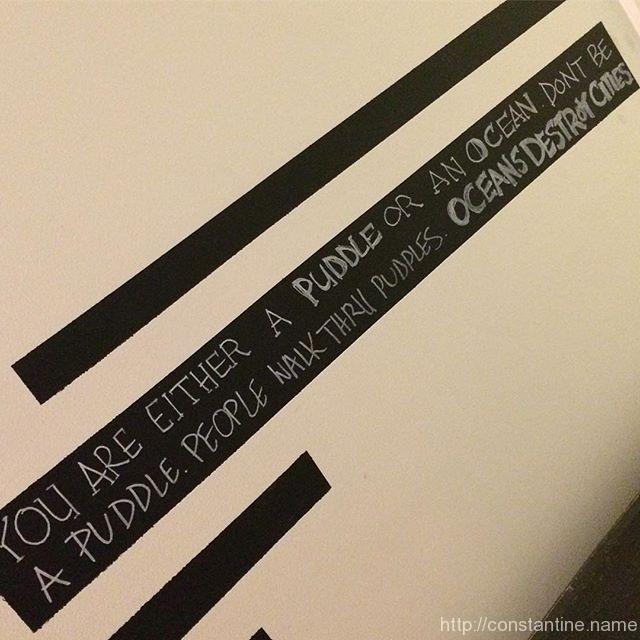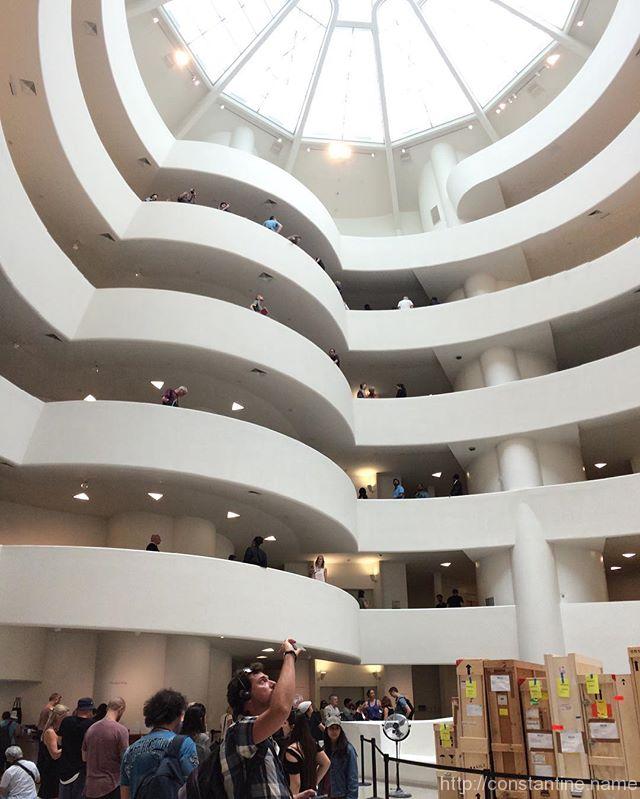Every man has some peculiar train of thought which he falls back upon when he is alone. This, to a great degree, molds the man.
~ Dugald Stewart
slip:4a1468.
Every man has some peculiar train of thought which he falls back upon when he is alone. This, to a great degree, molds the man.
~ Dugald Stewart
slip:4a1468.
Silence is exhilarating at first—as noise is—but there is a sweetness to silence outlasting exhilaration, akin to the sweetness of listening and the velvet of sleep.
~ Edward Hoagland
slip:4a1279.
I distinctly remember [my dad] saying not to worry about what I was going to do because the job I was going to do hadn’t even been invented yet. […] The interesting jobs are the ones that you make up. That’s something I certainly hope to instill in my son: Don’t worry about what your job is going to be. […] Do things that you’re interested in, and if you do them really well, you’re going to find a way to temper them with some good business opportunity.
~ Chris Young
slip:4a1018.
This is not a passive-aggressive maneuver to get you to scroll to the bottom, read the footer and consider supporting my work. (It would mean a lot though if you did.)
This is a serious question which I ask myself at a frequency approaching every minute. All the benefits are not directly measurable.
Exposure — In order to ensure I have material to write posts, I have various processes and systems that force me to skim an insane amount of stuff pretty much every day. If you imagine skimming my weekly email in a second or two, that’s 7 items. I skim about 300 to 500 items every day. A small number each day catch my attention enough that I toss them on my read-later queue. There are 764 things on that queue at this instant. It takes me significant time to read them, but often just a few seconds to realize, “yeah this is going to be a blog post” (and then I go on reading to the end and then I write the post.) If I stopped blogging, would I still do all that work to be exposed to ideas?
Learning — Writing blog posts creates a third “imprint” in my mind. First a glance, then a read, and then thinking about it. Even if I sometimes abort the blog post mid-writing, it’s still three different repetitions. And I have software that feeds me my own blog posts (“what did I post 10 years ago, today?” etc.) so I am constantly re-reading everything on this site; that’s more repetitions as things drift into history.
Integration — If I write a blog post about it, I generally try to figure out its relationship to everything else. Adding blog tags is the most obvious bit of integration. But figuring out what to pull quote involves deciding what is salient to me. And deciding which part(s) I want to focus on, magnify, or disagree with requires further integration.
Writing — Thoughts swirl in my mind. Characters appear on my screen. There are several skills one can work on between those two sentences.
All of that goes into feeding my personal growth and priming my curiosity. Since good conversation is powered by genuine curiosity, all that stuff also enables my person mission.
Should I keep blogging? It doesn’t feel like stopping is realistically an option.
ɕ
What insights and strategies from personal experiences can enhance podcast creation, audience engagement, and content sharing?
This conversation explores how passion transforms podcasting into a tool for connection and creative expression.
You begin with looking at the podcasts that you do love, listen to, or what is the kind of audio you enjoy consuming. But the next thing you need to do is start defining the difference between: okay I was in love with what it had to say, versus how did it bring me through and get me to understand what it had to say. So you’re looking at the mechanism.
~ Kato McNickle (13:20)
This conversation highlights how personal experiences, particularly in theater and storytelling, shape an individual’s approach to podcasting. Topics discussed include the interplay of soundscapes, rhythm, and emotional resonance in creating a compelling audio experience. Kato shares insights from directing films and plays, connecting those learnings to podcast production.
Another key theme is the importance of championing others and building genuine connections through shared interests. This approach is contrasted with traditional marketing methods, emphasizing the value of interaction and authenticity in promoting podcasts. Practical advice is offered for analyzing and improving podcast structures by examining admired examples and borrowing elements for creative reinterpretation.
Takeaways
Championing others — Sharing others’ work authentically builds credibility and fosters deeper connections.
Analyzing structure — Dissecting and understanding the mechanisms of admired podcasts improves storytelling and technical skills.
Theater and podcasting parallels — Skills in soundscapes, rhythm, and stage presence translate effectively into podcast production.
Emotional resonance — Podcasts benefit from an intentional focus on creating an intimate and emotionally engaging experience for the listener.
Content and connection — Prioritizing why a podcast exists and the connection it creates with listeners outweighs technical perfection.
Resources
Gaping Void — Mentioned as an example of how people share creative social objects to spark conversations.
The History of English Podcast — Referenced as an example of a passion project inspiring podcasting creativity.
Star Wars storytelling structure — Referenced as a framework for adapting classic narratives to new formats.
(Written with help from Chat-GPT.)
ɕ
What role do movement and Parkour play in personal growth and self-discovery?
The journey from childhood play to structured Parkour reveals profound insights into discipline and self-development.
In order to be free, you have to do what you feel is the right thing, not just what you want to do the whole time.
~ Pedro Bessa (21:28)
The conversation examines the transition from casual exploration to structured training in Parkour, highlighting the importance of discipline, values, and self-discovery. Pedro shares how childhood experiences with activities like BMX and skateboarding laid a foundation for Parkour. He emphasizes that movement is not merely about physical achievement but about cultivating a mindset that fosters lifelong exploration and learning.
The discussion touches on coaching and self-training, focusing on the role of community and individual accountability. Pedro reflects on the impact of values like honesty and persistence in self-directed training. Additionally, he discusses how traveling and experiencing new environments and cultures enhances both physical practice and personal growth.
Takeaways
The transition from challenges to training — The evolution of movement from playful challenges to structured Parkour.
The philosophy of exploration — Applying lessons from movement to various areas of life.
The importance of values — How honesty and discipline shape self-coaching and personal growth.
The role of community — How collaborative feedback and shared experiences enhance training.
The impact of travel — How experiencing different cultures and environments fosters unique physical and mental growth.
The magic of shared play — How engaging with others in Parkour creates meaningful connections.
Discipline as freedom — How structured practice enables more profound personal liberation.
Resources
ADAPT Qualifications — The coaching program discussed, emphasizing structure in Parkour training.
Parkour Generations — An organization mentioned as a source of learning and coaching in the discipline.
(Written with help from Chat-GPT.)
ɕ
How can the concept of possibility be explored and applied to creativity, podcasting, and personal growth?
The interplay between flexibility and structure shapes meaningful projects.
What’s the one thing that you can do right now where you are with what you have? Because that you can actually do something about.
~ Nicole Warner (20:06)
The conversation centers on the concept of possibility and its relationship to creativity, podcasting, and personal development. Nicole and Craig discuss the balance between flexibility and structure in creative work, emphasizing the need to embrace uncertainty while maintaining clear boundaries. They highlight how possibilities can inspire growth but also require constraints to channel energy effectively.
Practical strategies such as showing up consistently, imposing restrictions, and focusing on what can be done immediately are explored. The discussion also touches on broader themes, including personal accountability, the human element in creative endeavors, and the risks of over-optimization. Insights are shared about the role of curiosity, boundaries, and intentional action in realizing creative potential.
Takeaways
Creativity and structure — Creativity flourishes when possibilities are shaped by boundaries.
The importance of showing up — Consistent effort is essential for uncovering new opportunities and directions.
Balancing flexibility and planning — Plans serve as starting points, but flexibility is needed to adapt and grow.
Overcoming overwhelm — Restricting possibilities can transform an abundance of ideas into manageable steps.
Actionable possibilities — Progress is made by focusing on what can be done immediately with available resources.
The human element — Removing humanity from processes diminishes creativity and connection.
Saying no — Setting boundaries helps prioritize meaningful projects and avoid dilution.
Simplicity and optimization — Over-optimization can lead to sterility, hindering creativity and growth.
Resources
German with Nicole — Nicole Warner’s platform for teaching German language and culture.
Electric Fetus — A record store in Minneapolis mentioned as a notable location.
Seth Godin’s blog — Referenced in the conversation for insights on creativity and optimization.
Short Circuit movie — Cited for its perspective on AI and its limitations.
(Written with help from Chat-GPT.)
ɕ
How do personal experiences, mindfulness, and language intersect in creating meaningful storytelling and connection through creative projects?
Discovering awe in everyday life transforms ordinary walks into memorable narratives.
I look for moments that are going to make me feel something and I pay attention. So I bring the senses fully— like I’m listening, I’m observing, I’m feeling the temperature of the air. Whatever it is. And then there’s always a moment that I then capture and I write about it.
~ Tania Del Rio (1:43)
The conversation explores how mindfulness and sensory experiences inspire creativity, particularly through the creation of audio stories based on outdoor observations. The process involves engaging deeply with the environment, capturing moments of awe, and translating them into concise, impactful narratives. This practice has not only enhanced the creator’s appreciation of Paris but also fostered a unique way to connect with others.
Language also plays a pivotal role, influencing the pace and nature of creative expression. Discussing the challenges and rewards of teaching and creating in multiple languages highlights how language affects cognition and communication. The conversation reflects on the value of practice and patience in mastering new skills, whether it’s writing, recording, or engaging with a different culture.
Takeaways
Creating meaningful stories — Immersing oneself in sensory experiences can lead to authentic and compelling storytelling.
Language and creativity — Operating in different languages impacts the way ideas are formed and communicated.
The importance of practice — Developing habits, like daily recording, strengthens creative muscles and fosters consistency.
Mindful observation — Paying close attention to details in nature or urban settings enhances appreciation and presence.
Challenges of teaching — Adapting to teach in another language requires patience and perseverance but can open new opportunities.
Cultural connection — Learning a local language enriches cultural experiences and builds stronger connections.
Resources
Postcards from Paris Podcast — Tania’s podcast capturing moments of mindfulness and sensory immersion in Paris.
(Written with help from Chat-GPT.)
ɕ
There are three deaths. The first is when the body ceases to function. The second is when the body is consigned to the grave. The third is that moment, sometime in the future, when your name is spoken for the last time.
~ David Eagleman
slip:4a602.
Ought you not first to have acquired something by the use of reason, and then to have made that secure? But you are studying to be able to prove things in argument. Prove what, though? You are studying so as not to be shaken by fallacious arguments. Shaken from what? Show me first what you are watching over, what you are measuring, or what you are weighing; and then, accordingly, show me your balance.
~ Epictetus
slip:4a240.
Remember that anything really worth doing is probably hard work, and will absolutely require you to do things you don’t currently do, which will feel uncomfortable for a while. This is a “hard truth” we must all face. If it was easy, everyone would already be doing it.
~ Shane Parrish from, At Some Point, You Have to Eat The Broccoli
slip:4ufoea1.
Somewhere along the way, I learned to like vegetables. I mean, really like vegetables. I know you think I said, “give me a lot of vegetables,” but what I actually said was, “give me all the vegetables.” Brussel Sprouts? Do you remember when they used to be bitter? …because, yes, they really did breed them differently in recent decades to be less bitter. Artichoke—not just the hearts, but the whole thing… yes, I know how to make them, and keep your hands out of the way when I eat them. But a good one is hard to find these days as they’ve been bred to be more “palatable.” Peppers, yes of all sorts. Tomatos, I ate them all. Beans, kale, spinach, turnips, cucumbers… steamed, raw, tossed as summer salad (aka, with EVO and red wine vinegar)… nom nom nom nom.
A little over a year ago, I settled on my personal mission: Creating better conversations to spread understanding and compassion. To make progress on that, I need to eat my vegetables. And—as discussed—I love me some vegetables. I’m currently, slowly working on adjusting my life to be focused on two things: Recording kewl conversations with people, and writing; writing about those kewl conversations. It’s not that I currently have responsibilities to eschew, but rather there are still too many off-focus things I do which I’m working to eliminate.
ɕ
What are the ways in which personal narratives, self-perception, and mentorship influence an individual’s path to growth and transformation?
If you want to know someone, have a conversation with them. But if you want to know who they really are, have a conversation with their partner. Thomas Droge and Brenda Kahn share their story and how they’ve changed over the years. They explore the idea of our internal narratives and self-perceptions, finding your own way, and the human experience of time. Brenda and Thomas discuss ways to change the world and the importance of investigating your history.
I’ve been writing a memoir. And I had a really fascinating experience with it, because I got all the way through it, and realize that everything that I told myself about myself was totally not true. […] the stories we tell ourselves, literally, inform our lives in a way that have real consequences in the real world. And when you take a step back and look at yourself and decide, wait a second, you know, they actually did a lot of really cool things, you know— this was kind of amazing. So then I had to start the whole thing over again from this whole different slant.
~ Brenda Kan (38:24)
This conversation explores how personal stories and perceptions shape our lives and how reevaluating them can unlock growth. Brenda reflects on writing a memoir and discovering that her past achievements were much more significant than she initially believed, illustrating the transformative power of storytelling. Thomas complements this idea by discussing mentorship and the value of learning from both older and younger generations to stay connected with evolving perspectives.
And he said, for me, one of the things that I think people always miss in mentorship is that you need mentors who are younger than you, to share with you what’s changing in the world, and keep you connected to what’s happening. And mentorship is really a two way street, of the younger generation, connecting you with the world and what’s happening and showing you what’s changing from their point of view. To teach you so that you don’t get stuck in your static view of the world.
~ Thomas Droge (33:17)
The discussion also touches on movement practices, mindfulness, and self-discovery, connecting these to larger themes like time perception and narrative transformation. By examining personal experiences, they highlight the importance of self-awareness and adaptability in personal and professional contexts, as well as the role of mentors and shared knowledge in shaping these journeys.
Takeaways
Mentorship’s reciprocal nature — Younger mentors help connect older generations to evolving perspectives, making mentorship a two-way exchange.
Personal narrative’s power — Revisiting and reframing personal stories can completely transform self-perception.
Movement as insight — Physical practices like Tai Chi or Parkour help reveal inner narratives and foster growth.
The interplay of time and perception — Understanding time through different lenses offers tools for navigating personal transformation.
Storytelling and compassion — Approaching one’s story with compassion opens up new possibilities for growth and healing.
Resources
Dolores Huerta Foundation — Civil rights organization founded by Dolores Huerta.
Taoism and Dragon Gate Teachings — An overview of the Dragon Gate Taoist philosophy.
(Written with help from Chat-GPT.)
ɕ
Over a billion people currently use Facebook — many at the cost of anxiety, lost honor, personal freedom, and certainly time. If asked why, however, many would reply, “why not?” The service is free, conventional wisdom tells us, so no matter how minor the benefits (which tend to orbit around a generalized fear of missing out), they’re still more substantial than the cost. But as Seneca points out, this assessment is misguided because it ignores the human toll of social media.
~ Cal Newport, from Seneca on Social Media – Cal Newport
slip:4ucabo33.
I generally try to suppress my urge to pounce on opportunities to talk about the well-known downsides of social networks. But a Seneca-CalNewport two-for-one is simply irrestible catnip for me. Here, Newport is referring to the value of one’s own time. That’s the human “toll” that so many people—as far as I can see at least—don’t factor in.
I think I am ready to give up fighting the fight; I’m done [or at least, I really should get a grip, and learn to be done] beating the drum about the evils of social networks. Know what I’m going to do instead? Double-down on creating things on the open web and let people decide what they want to do.
ɕ
The annotated version of the visualization (shown above) highlights the GEOS FP model’s output for aerosols on August 23rd, 2018. On that day, wildfires caused huge plumes of smoke to drift over North America and Africa, three tropical cyclones took place in the Pacific Ocean, and high winds over the Sahara caused wind-borne dust particles to fill the sky. All of these produced aerosols which are represented in the visual by different colors.
~ Matt Williams from, Look at all the Aerosols Pushed into the Atmosphere, from Fires, Volcanoes and Pollution. Even Sea Salt Thrown into the Air from Hurricanes – Universe Today
slip:4uuilo1.
I’m not sure if I’m more impressed by the beautiful composite photo and the science that went into it, or if I now just want to never inhale again.
ɕ

Hello asphalt my old friend, I’ve come to talk with you again. (Anyone name that tune?) Slow session, but managed to do everything in sets of 25,25,25,26.
ɕ
The un-examined cake will bury you in a never-ending steady stream of slow debris, your life wasted in lower-order, derivative problems.
~ Bryan Ward from, What Happens When Men Shirk The Deep Fix
slip:4utiai5.
ɕ
Next weekend I will be moderating a session about the state of global parkour organization. Please follow the link and submit any questions you feel would benefit the discussion.
http://artofretreat.com/governance/
This session is happening at the Art of Retreat (a parkour leadership and education retreat) in New York City. The event itself is full, but there’s great information on their web site about the speakers, and presentations to inspire you to attend next year.
Meanwhile, this year the event organizers are working to produce more take-aways for the participants and the parkour community at large. As part of the preparation for the Friday session, we are producing a detailed report about the current state of global organization efforts. It will be made publically available as a PDF.
ɕ

“Oceans destroy cities!” Also in the hallway, “Your butt looks good in that outfit.” Why thank you! :)
ɕ

Guggenheim. Just a quick peek in the lobby :)
ɕ

A b-e-a-utiful day in THE city!
ɕ

On our first day in Red River Gorge, we drove to a nearby “roadside crag”. After a brief walk in, we encountered this magnificent block covered in 10a+ routes.
ɕ
Post class thoughts? Not many. Class is usually pretty visceral, (as one would expect,) and there’s not much time for an internal dialog of philosophical thinking. There were of course various opportunities to come up with relatively creative solutions to physical movements and challenges. But nothing particularly interesting in the context of this discussion. I think the primary reason this “alternate paths” section didn’t stand out in class was that everyone there already thinks this way. Almost everyone in class is already applying this section’s ideas — at least applying it in the physical context.
And so, I hadn’t bothered to put up a “nothing to report” report. Until I happened to read:
As you begin to learn something, notice when you feel frustrated with sucking. It might be really difficult, confusing, full of failure. You’re out of your comfort zone, and you want to go back into it.
Now turn to this feeling of frustration, or whatever difficult feeling you’re having: confusion, impatience, boredom, feeling bad about yourself, wanting to quit.
Turn to the feeling, and instead of trying to stop it or avoid it … try sitting with it (or running with it). Just be there with it. Let it be in you, give it space.
~ Leo Babauta, from The Gentle Art of Trying Something & Sucking at It – Zen Habits Website
slip:4uzesu2.
I’m pulling disparate threads together here of course. But this is the feeling! I look at something really sketchy, challenging or downright scary, and my mind flees to the easy path. Took a lot of work to get my body to NOT flee to the easy path, which eventually gave my mind a bit of time to look at the “I don’t think so…” path and give it some consideration. In hindsight, I think it’s what Babauta describes so succinctly.
So, uh, yeah. What Thibault said. And also what Babauta said. :*)
ɕ
Ever notice how drinking’s like war?
~ Moxy Früvous, from The Drinking Song
Cup o troops oe’r the guns
Til the end of our health
A campaign ‘gainst myself
Armed with bourbons and scotches and rums
slip:4a1060.